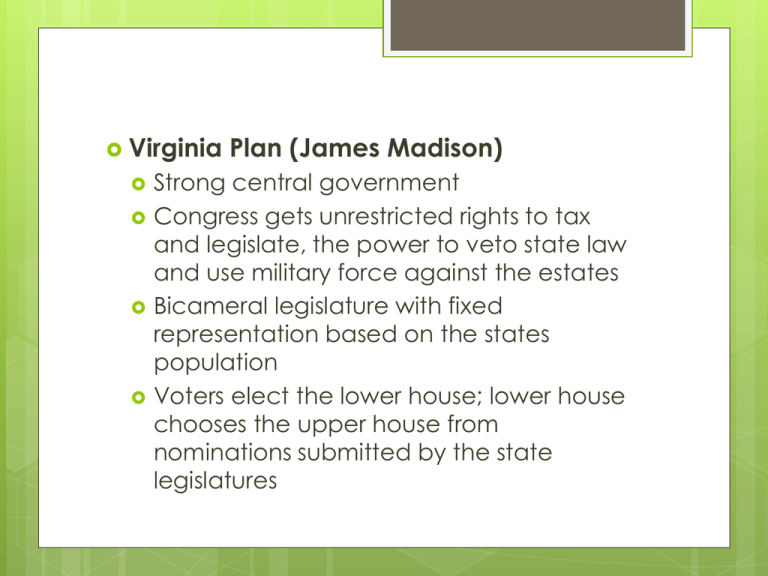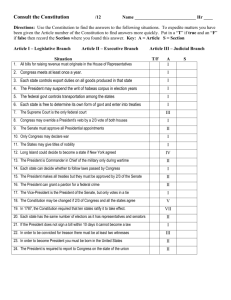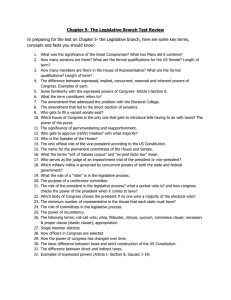Virginia Plan (James Madison)
advertisement

Virginia Plan (James Madison) Strong central government Congress gets unrestricted rights to tax and legislate, the power to veto state law and use military force against the estates Bicameral legislature with fixed representation based on the states population Voters elect the lower house; lower house chooses the upper house from nominations submitted by the state legislatures New Jersey Plan (William Patterson) Recommended a single chamber congress with each state having equal vote Congressional laws the supreme law of the land Courts could force reluctant states to accept these measures Connecticut Compromise Equal vote for each state in the upper Proportional voting for the lower The new document accomplished the following: Reconciled conflicting interests between the large and small states Established national authority The Senate and House Lay and collect taxes Regulate interstate commerce Conduct diplomacy State officials must swear an oath to uphold the Constitution Use of military force against any state This is an abandonment of the Articles of Confederation But there was restraint (or at least their should be if Americans understand this document and don’t allow any or all branches to get too powerful) Three distinct branches Checks and balances Federalism Legislative: House Requirements for office Apportionment of the seats process by which seats in the United States House of Representatives are distributed among the 50 states Gerrymandering manipulate the boundaries of (an electoral constituency) so as to favor one party or class Term of Office Presiding officer Powers Impeachment Taxes What is the major criticism of Congress?? http://video.pbs.org/video/2365007413/ http://www.kentucky.com/2013 /06/17/2682198/beshear-sayslawmakers-may-redraw.html http://en.wikipedia.org/wiki/List_ of_members_of_the_United_Stat es_Congress_by_longevity_of_ser vice Legislative: Senate Requirement for Office Membership Term of Office Presiding Officer Powers 2/3 consent (treaties) Majority vote to confirm Supreme Court nominations and Cabinet appointments Jury role during impeachment trial Foreign Affairs Filibuster Cloture (3/5 of the Senate present) to shut this down (normally 60 votes) Current Senate breakdown = 53 (D), 2 (I), 45 (R) http://www.senate.gov/senators/Bio graphical/longest_serving.htm Do they represent us? Age Education Law degrees are held by 167 Members of the House (38% of the total House) and 55 Senators (55% of the total Senate) Military service (21.8% of Congress) Foreign born (8 Reps and 1 Senator) Women (Ninety-one women-16.8% of the total membership) House- 56.7 years; Senate- 62.2 years House - 74 Senate – 17 http://www.ipu.org/wmn-e/classif.htm African Americans- 44 members (all House) Hispanic or Latino- 31 members (29 House; 2 Senate) Congressional Powers Expressed Powers Article I, Section 8 Necessary and Proper Clause Article I, Section 8, Clause 18 of the U.S. Constitution"[The Congress shall have Power] . . . [t]o make all Laws which shall be necessary and proper for carrying into Execution the foregoing Powers and all other Powers vested by this Constitution in the Government of the United States, or in any Department or Officer thereof." Implied Powers According to the necessary and proper clause, Congress generally may assume additional powers not specifically listed in the Constitution, sometimes called implied powers, if there is a link to a power that is listed in the Constitution. For example, Congress may allocate money to test a missile-defense system (something not specifically listed in the Constitution) because Article I, Section 8, Clause 12 gives Congress the power to "raise and support Armies." Are these Implied Power? Congress sets a federal minimum wage. Congress establishes the United States Air Force. Congress establishes national parks. Congress creates federal laws against pollution. Congress makes laws regarding discrimination in employment. Congress decides that televisions should have Vchips that enable parents to block certain shows. Congress passes the Gun-Free School Zones Act prohibiting anyone from possessing a firearm in a school zone. The Executive I can. . . Identify the President’s many roles Understand the formal qualifications necessary to become President Discuss issues involving the length of the President’s term Explain how the Constitution provides for presidential succession Understand the Constitutional provisions relating to presidential disability Describe the role of the Vice President Explain the framer’s original provisions for choosing the President Understand the function of the electoral college Describe the flaws of the electoral college system Executive http://www.gallup.com/poll/28693/w hich-characteristics-most-desirablenext-president.aspx Worst http://www.usnews.com/listings/worstpresidents/zachary-taylor Best http://www.gallup.com/poll/146183/americanssay-reagan-greatest-president.aspx Sexiest (?) http://www.nerve.com/content/the-top-43-sexiestus-presidents Executive Requirements for office Constitutional vs. societal Amendments 12th – Pres. and VP 20th – Lame Duck 22nd - Tenure 25th – Succession Electoral College How is it calculated? What if no majority? Who has power in this system? Roles of the President Chief of State This role requires a president to be an inspiring example for the American people. In some nations, the chief of state is a king or a queen who wears a crown on special occasions, celebrates national holidays, and stands for the highest values and ideals of the country. As the American Chief of State, the president is a living symbol of the nation. It is considered a great honor for any citizen to shake the president's hand Awarding medals to the winners of college scholarships. Congratulating astronauts on their journey into space. Greeting visitors to the White House. Making a patriotic speech on the Fourth of July Chief Executive The president is "boss" for millions of government workers in the Executive Branch, deciding how the laws of the United States are to be enforced and choosing officials and advisers to help run the Executive Branch Appointing someone to serve as head of the Central Intelligence Agency (CIA). Holding a Cabinet meeting to discuss government business. Reading reports about problems of the Federal Bureau of Investigation (FBI) Chief Diplomat The president decides what American diplomats and ambassadors shall say to foreign governments. With the help of advisers, the president makes the foreign policy of the United States Traveling to London to meet with British leaders. Entertaining Japanese diplomats in the White House. Writing a message or a letter to the leaders of the Russia Commander in Chief The president is in charge of the U.S. armed forces: the Army, Navy, Air Force, and Marines. The president decides where troops shall be stationed, where ships shall be sent, and how weapons shall be used. All military generals and admirals take their orders from the President. Inspecting a Navy yard. Deciding, in wartime, whether to bomb foreign cities. Calling out troops to stop a riot Chief Legislator Only Congress has the actual power to make laws. But the Constitution gives the president power to influence Congress in its lawmaking. Presidents may urge Congress to pass new laws or veto bills that they do not favor. Inviting members of Congress to lunch in the White House. Signing a bill of Congress. Making a speech in Congress. Chief of the Party In this role, the president helps members of his political party get elected or appointed to office. The president campaigns for those members who have supported his policies. At the end of a term the president may campaign for reelection Choosing leading party members to serve in the Cabinet. Traveling to California to speak at a rally for a party nominee to the U.S. Senate Chief Guardian of the Economy In this role, the president is concerned with such things as unemployment, high prices, taxes, business profits, and the general prosperity of the country. The president does not control the economy, but is expected to help it run smoothly Meeting with economic advisers to discuss ways to reduce unemployment. Meeting with business and labor leaders to discuss their needs and problems Chief Citizen The Electoral Map http://www.270towin.com/ http://elections.nytimes.com/2012/prima ries/candidates http://elections.nytimes.com/2012/prima ries/calendar http://elections.nytimes.com/2012/prima ries/results Executive Powers of the President Commander in Chief Head of Cabinet Grant pardons Negotiate Treaties Nominate Supreme Court Justices Fill vacancies during Senate recesses The Cabinet includes the Vice President and the heads of 15 executive departments State (1789) Treasury Defense Justice Interior (1849) Agriculture (1862) Commerce (1913) Labor (1913) Health and Human Service (1953) Housing and Urban Development (1965) Transportation (1966) Energy (1977) Education (1979) Veterans Affairs (1988) Homeland Security (2002) http://www.senate.gov/pagelayout/re ference/nominations/Nominations.htm Judicial Chief Justice John Roberts (56); 6 years Antonin Scalia (75); 25 Anthony Kennedy (75); 23 Clarence Thomas (63); 20 Ruth Bader Ginsburg (78); 18 Stephen Breyer (73); 17 Sam Alito (61); 5 Sonia Sotomayor (57); 2 Elena Kagen (51); 1 The Role of the Court http://video.pbs.org/search/?q=framewor k+constitution+usa Article IV – Relations among the states Article V – Amending process Article VI – Supremacy Clause Article VII - Ratification Art. IV Relations Among the States Full faith and credit shall be given in each state. . . Privileges & Immunities; Extradition New States: congressional control Each state is guaranteed a republican form of govt. Art. V Art. VI Supremacy Clause This is pretty simple: The U.S. Constitution is the ultimate trump card Art. VII Amendment option 1 All persons who have been a naturalized citizen of the United States for 20 years or more will be considered eligible for the office of the Presidency. This overrides the current natural-born qualification, but does not affect the age and/or residency requirement. Amendment option 2 Purposeful desecration of the U.S. flag is hereby established as a criminal act. Desecration is defined as “the act of depriving something of its sacred character.” Burning of the flag in a retirement ceremony will be allowed as long as the proper steps in doing so are followed. Enforcement will be at the hands of local law authorities. The following federal guidelines for punishment are - $5000 fine and up to 5 years in jail). Amendment option 3 In an effort to strength the academic preparedness of our citizenry, we hereby establish that children under the age of 18 are barred from contractually engaging in employment during the following time: School nights during the academic year - as defined by their school district. Full legal employment may begin on the day of the citizen’s 18th birthday. Amendment option 4 All senators and representatives to the U.S. Congress are hereby limited to a specific number of terms (consecutive or nonconsecutive) in that particular office: Representatives will be allowed a total of four complete terms in office (8 years of service). Senators will be allowed a total of two complete terms in office (12 years of service). Amendments and our Constitution Our Constitution is a living document The process is not easy It can be amended 2/3 of Congress to propose; ¾ of the states to ratify States are very politically driven States are very different The process preserves the principle of federalism Congress proposes; states ratify 11. You cannot sue another state except with permission by that state's judicial system. 12. The electoral college must have two separate elections for president and vice president. They now run as a ticket. 13. Abolishes slavery. Emancipation. All slaves are free. 14. Every foreign born citizen now has right to "due process" 15. All men get the right to vote - including ex-slaves 16. The Federal Income Tax is established 17. The people elect their own US senators 18. Alcohol is prohibited 19. Women get the right to vote 20. January 20th is the day that a new president takes office (lame duck) 21. It is no longer illegal to drink Alcohol. The 18th amendment is struck down. 22. A president can only have 2 terms in office. 23. Washington DC can vote for the president 24. You may not charge people money so that they can register to vote (poll tax) 25. Lays down the rules for who becomes president if the president dies/resigns etc. 26. You can vote at the age of 18. 27. Congressmen cannot vote to give themselves a raise in the same term.







